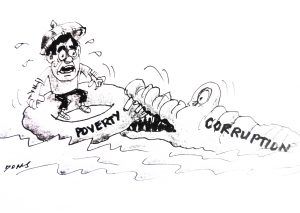For a country like the Philippines which is plagued by persistent poverty, corruption acts as a catalyst that perpetuates the vicious cycle of poverty. We have yet to see how corruption exacerbates poverty in the Philippines, and how detrimental the effects of corrupt practices are on the economic, social, and political fronts. Imagine the Samar Highway as a classic effect of alleged corruption.
Corruption not only diverts funds intended for public welfare but also hinders foreign direct investment (FDI) and economic growth. Rampant corruption undermines investor confidence, discouraging both domestic and foreign investment. With limited private sector participation, job creation becomes sluggish, leaving millions in poverty. Moreover, corrupt practices inflate the cost of public goods and services, disproportionately burdening the poor. Inefficient allocation of public resources due to corruption restricts economic opportunities and amplifies income inequality, further deepening poverty.
Within the public sector, corruption heightens social disparities and weakens social programs designed to alleviate poverty. Limited government resources are usually misappropriated, reducing the reach and quality of public services such as education and healthcare. This disproportionately affects the poor, who depend heavily on these services. Access to quality education and healthcare then becomes a privilege, perpetuating intergenerational poverty.
Corruption in our country undermines democratic processes and erodes the public’s trust in governance. Corrupt practices allow influential elites to capture political power, impede policy reforms, and weaken institutions that are essential for poverty reduction. The diversion of public resources into private pockets subverts the notion of public service and creates a sense of hopelessness among citizens. The poor lose faith in their government, making it increasingly difficult to effectively foster social inclusion and implement poverty alleviation policies.
Indeed, the corrosive influence of corruption on the economy, society, and politics exacerbates poverty, stifles progress, and perpetuates inequality. It requires a comprehensive strategy that includes robust legal frameworks, transparency, and accountability mechanisms, as well as citizen participation to address corruption. We hope we can still break free from its grip and pave the way for inclusive economic growth and poverty reduction.




